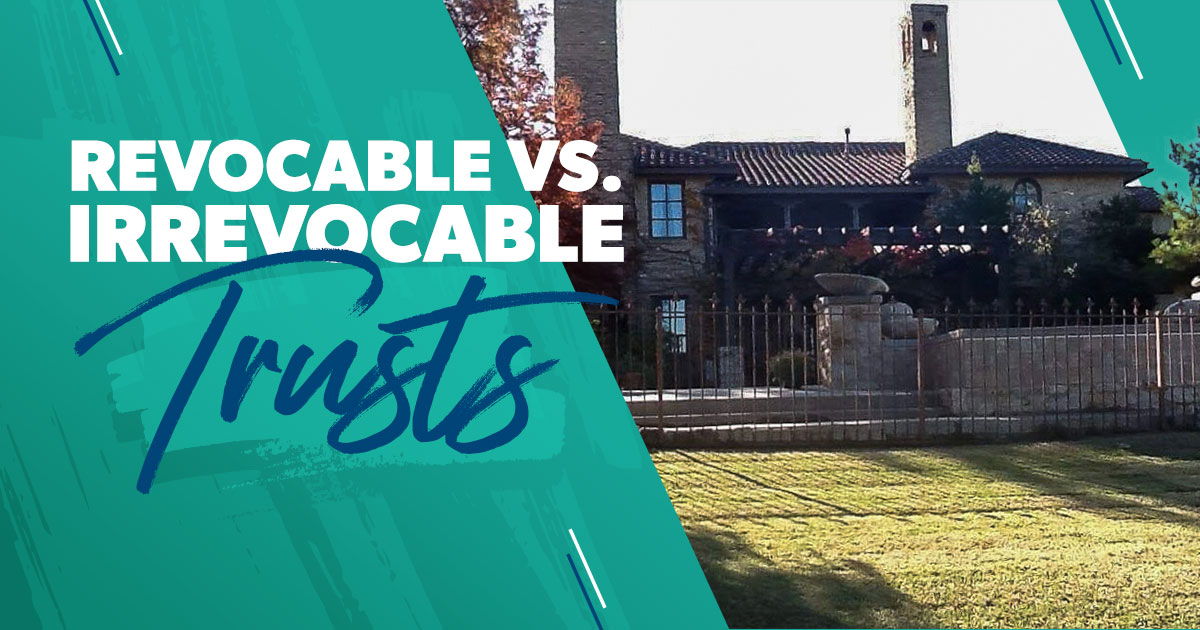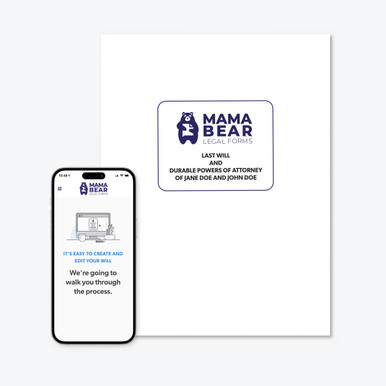What’s the Difference Between a Revocable and Irrevocable Trust?
10 Min Read | Jul 24, 2024

Maybe you’ve seen those late-night infomercials with lawyers spitting out terms faster than an auctioneer: Irrevocable trusts. Living trusts. Revocable trusts. Insurance trusts. AB trusts. How the heck are you supposed to know what those are and if you need one?
If this stuff is more confusing to you than the laws of thermodynamics, you’ve come to the right place. We’ll walk you through the pros and cons of irrevocable and revocable trusts (in plain English) so you know exactly what you’re getting into.
But before we get started, here’s something worth mentioning: Unless you have a pretty big estate, you probably don’t even need a trust. Most people only need a will.
- What’s the Difference Between a Revocable and Irrevocable Trust?
- What Is a Revocable Trust?
- What Are the Benefits of a Revocable Trust?
- What Is an Irrevocable Trust?
- What Are the Benefits of an Irrevocable Trust?
- What Are the Types of Irrevocable Trusts?
1. What’s the Difference Between a Revocable and Irrevocable Trust?
The biggest difference between a revocable and irrevocable trust? A revocable trust can be changed at any time if the grantor (the person who made the trust) is of sound mind, and an irrevocable trust cannot be changed. Once all beneficiaries agree to the terms and everyone signs on the dotted line, irrevocable trusts are stuck like that forever.
Save 10% on your will with the RAMSEY10 promo code.
Another major difference is that irrevocable trusts are protected from taxes and creditors. Revocable trusts don’t get either of those safety nets.
Here’s a table that shows an overview of the pros and cons for each type of trust.
|
Revocable Trust |
Irrevocable Trust |
|
|
Pros |
|
|
|
Cons |
|
|
Now let’s get into more detail for each type of trust.
2. What Is a Revocable Trust?
A revocable trust (aka a living trust) is the most common type of trust. And that’s mostly because of its flexibility. You can update it anytime you want—as long as you’re still alive and of sound mind. For example, you could transfer more assets (like land, money and heirlooms) to your trust, add or remove beneficiaries, or sell trust property.
Once you pass away, your revocable trust automatically becomes irrevocable. At that point, your successor trustee (the person who takes charge of the trust after you pass) will follow the instructions in your trust document to make sure your assets end up where they’re supposed to.
3. What Are the Benefits of a Revocable Trust?
So, why would you want to set up a living trust in the first place? Good question! Here are the benefits of a revocable trust:
Avoids Probate
A revocable trust doesn’t go through probate court (the court that supervises how a deceased person’s assets are given out), and that’s a big load off your family. After all, who wants to take off work to sit in a courtroom—possibly even several times?
A trust can save your family and loved ones time and money—and it also helps them get your assets faster. Everybody wins. But it’s worth noting that a will or trust still has to be verified as valid, which means a judge will have to sign off on it at some point.
Protects Your Wishes
A revocable trust allows you to maintain control of your assets until you’re not mentally or physically able. If you have a family history of Alzheimer’s or early-onset dementia, this can provide much-needed peace of mind. If the worst should happen, you’ve got a backup plan.
Allows for Change
A revocable trust gives you the flexibility of adding or removing heirs, giving more or less to a person, or changing other details. So, if your brother decides Star Trek is better than Star Wars, you can make sure he doesn’t get your gold-plated lightsaber.
Preserves Privacy
By avoiding probate court, revocable trust details can stay private instead of becoming public record.
But Don’t Forget About Liability
Now, here’s a big drawback of a revocable trust: It doesn’t protect you from lawsuits or creditors. Since you can still control and access everything in your trust, you can be sued for liability.
For example, if somebody slips on the slick concrete next to your pool, they can sue you for the contents of your revocable trust—even if you posted a sign that says, “No Running!”
So now that we’ve gone over the details of revocable trusts, let’s talk about irrevocable trusts.
4. What Is an Irrevocable Trust?
An irrevocable trust is similar to a revocable trust, but with a few differences. One of the biggest exceptions is something we already mentioned—you can’t change an irrevocable trust. Once you sign on that dotted line, it’s frozen. You can’t take it back or say you changed your mind.
That means you can’t change who gets your grandma’s antique ring or decide to sell the ring for cash. In an irrevocable trust, it technically doesn’t belong to you anymore. It belongs to the trust.
There are benefits though. Let’s go over each one.
Interested in learning more about estate planning?
Sign up to receive helpful guidance and tools.
5. What Are the Benefits of an Irrevocable Trust?
Since irrevocable trusts are more permanent than a tattoo, you need to make sure the benefits outweigh the drawbacks for you. Here’s an explanation of each benefit:
Avoids Probate
Just like a revocable trust, an irrevocable trust avoids probate court, saving your family from unnecessary expense and time.
Includes Tax Benefits
Since you’ve given up ownership of anything listed in an irrevocable trust, that property can't be taxed when you die. It’s technically owned by the trust. And that’s a good thing, since the highest 2022 estate tax rate is a whopping 40%.1
Protects From Creditors and Lawsuits
If you have an irrevocable trust for all your assets, then the trust actually owns that stuff. That means if someone slips in your home and that home is inside an irrevocable trust, they can’t sue you. They also cannot sue the trust itself for the accident. But anything not in the trust is fair game for lawsuits.
Preserves Privacy
By avoiding probate court, irrevocable trust details can stay private instead of becoming public record.
6. What Are the Types of Irrevocable Trusts?
If trying to understand trusts wasn’t enough to make your head explode, getting a grip on the specific types of irrevocable trusts just might. There are a lot of them! But we whittled down the information for you so it’s easier to understand.
- Credit shelter trust (aka bypass trust or AB trust): Married couples typically use this type of trust to sidestep estate taxes. It works like this: When one spouse dies, the surviving spouse creates this trust and moves the assets into it. When the surviving spouse dies, assets still in the trust avoid the surviving spouse’s estate taxes and move forward to the heirs tax-free.
- Qualified terminable interest property trust (QTIP): This trust is commonly used in second marriages to protect both a current spouse and any children (it’s similar to the credit shelter trusts we just talked about). In the second marriage, when one spouse dies, the surviving spouse gets income from the trust but doesn’t have access to the assets and can’t change the beneficiaries. So, when the surviving spouse dies, assets go to the final beneficiaries—often including children from the original marriage. This helps to avoid the unfortunate (and not unheard-of) outcome where surviving children are deprived of any inheritance by their parent’s second marriage.
- Qualified domestic trust (QDOT): QDOTs work the same way as QTIP trusts except they can provide for a surviving spouse who isn’t a citizen.
- Grantor retained annuity trust (GRAT): A GRAT takes assets from a taxable estate to reduce taxes when the assets are given to heirs. The grantor (the person who made the trust) moves the assets into the GRAT and names their beneficiaries. Wondering about the purpose here? The main benefit of a GRAT is that the grantor still gets income from the trust until those assets are given to the heirs.
- Qualified personal residence trust (QPRT): A QPRT is similar to the GRAT, except that it’s exclusively for real estate. Here’s how it works: The grantor transfers the home to heirs but can still live in it rent free. Also, doing this helps the heirs save money on estate taxes when they get their inheritance.
- Spousal lifetime access trust (SLAT): Like a GRAT, a SLAT moves assets out of a taxable estate during the grantor’s lifetime. The difference with a SLAT is that the heirs can receive assets to help support the grantor. This type of trust is often used to avoid estate taxes.
- Generation-skipping trust: A generation-skipping trust lets grantors give assets directly to grandchildren. By doing this, the generation that got skipped can avoid estate taxes because they never owned any of the stuff.
- Dynasty trust: A dynasty trust looks way into the future, since it lets you pass assets from generation to generation while still avoiding estate, gift or generation-skipping taxes.
- Spendthrift trust: Got a loved one who’s also an incurable spender? This type of trust is for a beneficiary who can’t manage assets on their own (it can help head off irresponsible money management and protect assets in case the beneficiary is out of commission).
- Special needs trust: A special needs trust is for parents of children with disabilities. This type of trust is awesome since it protects those children financially without risking their access to government assistance.
- Intentionally defective grantor trust (IDGT): An IDGT lets the grantor pay taxes on the assets inside the trust. By intentionally paying taxes, the grantor can grow the trust’s value faster because there’s no annual tax bill.
- Irrevocable life insurance trust (ILIT): An ILIT includes a life insurance policy and can help you avoid paying taxes on that policy. When the insured person passes away, the trust also manages and distributes the death benefit.
- Charitable trust: Charitable trusts let charities enjoy favorable tax treatment.
- Asset protection trust: This kind of trust protects assets from creditors.
Okay, we get it. All the types and terms and subcategories of irrevocable trusts are more confusing than the unabridged IRS tax code. (But you have to admit, some of the names are pretty fun!) Just remember this: If you’re unsure, get outside help.
Revocable vs. Irrevocable Trust: Which Is Best for You?
If you’ve noticed, a lot of trusts are created to avoid hefty estate taxes. We’re talking millions of dollars at stake. So, unless you have a humongous estate, you don’t need to worry about a trust. An ordinary will is all you’ll need. Great news, right?
Instead of paying a lot of money to have a trust drawn up, work with a company that can help you create a will. We recommend RamseyTrusted provider Mama Bear Legal Forms. You can choose the specific kind of will you need and plug in your information—then you’re done. It’s super simple. And you won’t even get a migraine from trying to figure it all out. Get started on your will today!





